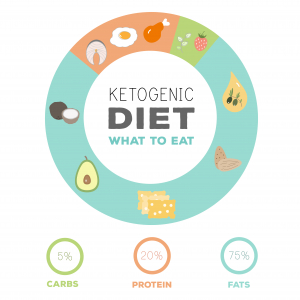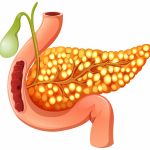Is a Ketogenic diet a potential treatment for obesity and type 2 diabetes?
A ketogenic diet is a high fat, moderate protein and a low carbohydrate diet. Although it has grown in popularity over the past 15 years, it has actually been used in the medical community for a longer period of time as treatment for epilepsy.
What does the diet consist of?
Healthy fats in the form of extra-virgin olive oil, avocados, nuts, butter, coconut oil and oily fish are the main staple of a ketogenic diet. Starches and grains including pulses are avoided at all costs. Starchy vegetables such as parsnips, sweet potatoes and carrots should be limited. Cruciferous vegetables along with other vegetables such as peppers, courgettes, cucumber and aubergines are permitted.
Physiology and biochemistry behind the Keto diet
A meal rich in carbohydrates results in the starch molecule being broken down into glucose which is then transported to tissues and organs. Keto diets instead utilise fats as the primary energy source. The fats are transported into the liver where they are converted into acetoacetate and β-hydroxybutarate, more commonly referred to as ketone bodies. Some specific tissues such as the heart muscle and the renal cortex prefer to utilise acetoacetate rather than glucose as an energy source. The brain and red blood cells in contrast prefer to utilise glucose as an energy source. During fasting or prolonged ketosis when glucose levels are low the brain adapts and utilises ketone bodies as a fuel. High level of ketone bodies in the blood signals the adipose tissue (body fat) to inhibit the synthesis of lipids.
Therapeutic treatment for obesity and type 2 diabetes?
The Western diet rich in processed grains and sugar has led to an obesity crisis. One of the consequences of obesity is type 2 diabetics (T2D). T2D have a condition known as insulin resistance, where the cells no longer respond to the hormone insulin. Carbohydrates especially refined ones and sugar tend to secrete a significant amount of insulin which leads to more fat accumulation. In the long term this can lead to insulin resistance. Therefore, by following a Keto diet which is low in carbohydrates naturally lowers insulin.
Within the last couple of years several studies have shown that ketogenic diets are not only safe but can be an effective treatment for T2D. The British cardiologist Dr Asheem Malhotra author of the Pioppi Diet and Dr David Unwin have been treating T2D patients with low carb diets for several years now (Saslow et al 2018).
It is worth mentioning that a keto diet should only be followed by individuals who suffer from epilepsy and are T2D and are under the direction of a health or nutritional professional. It may not be suitable for the general population and some side effects may impact your microbiome.
References:
Saslow LR, Summers C, Aikens JE, Unwin DJ Outcomes of a Digitally Delivered Low-Carbohydrate Type 2 Diabetes Self-Management Program: 1-Year Results of a Single-Arm Longitudinal Study, JMIR Diabetes 2018;3(3):e12
Written by: Federico Bernuzzi BSc Biochemistry, MSc Statistical Epidemiology, 2nd Year PhD in Molecular Nutrition at the Quadram Institute



